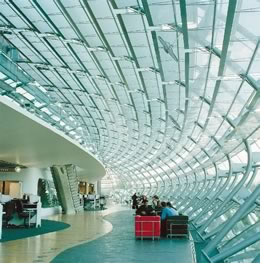 The local government of Swindon announced this week that is to be covered by a wireless Internet network. This could mean its 200,000 residents could log onto the Internet anywhere, and any time within the borough's boundaries.
The local government of Swindon announced this week that is to be covered by a wireless Internet network. This could mean its 200,000 residents could log onto the Internet anywhere, and any time within the borough's boundaries.Greg Dyke, the former director general of the BBC has adopted the initiative and so there is a big hitter involved. He was reported in the local newspaper, the Swindon Advertiser, last Monday saying that “Swindon has a real opportunity to turn itself into a centre for new media in the digital era.”
This announcement follows an initiative by BT one of our monolithic telecos with a 12 UK cities announced a few weeks ago.
City wide wifi was first introduced to Grand Haven, Michigan in 1994 and according to Yankee Group there are already around 300 municipal wireless projects in the US including San Francisco, so Shel, you may be next.With such local news, I had a hunt round to find out what advantages people see in municipality wide broadband.
The first obvious advantage is the provision of low-cost solution broadband access to low-income residents.It can save operational costs by providing broadband connectivity for public-safety such as video surveillance.
Welfare agencies can maintain minute by minute contact with there stakeholders.It opens up application of mobile wi-fi phones and services like Skype which will be a major cost advantage for many public and private bodies.
City governance cost drop, not least for contact with municipal workers.
Wi-Fi Internet access available to students in the local schools, libraries, and classrooms can be located anywhere in the city to connect to the Internet or school networks.
Workers in the locality like doctors will be able to wear wireless badges to replace pagers.
Depending on bandwidth, there is opportunity for digital radio and video of various kinds.
Then there is entertainment such as gaming devices and other applications.
Many believe the networks will help boost economic development by drawing more people to the city.
Certainly the cost of changing locations drop.
The use of blogs and wiki's for mobile and home workers becomes practical.
Communication such as in-store advertising, local podcast news and community networks are a real options as well.
Picture: Cellular Operations Building
Powered by Qumana
No comments:
Post a Comment